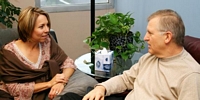All of us who are baby-boomers need to learn more about the services of a new breed of specialists gernerally referred to as geriatric case (care) managers.
The role of a geriatric care manager goes well beyond that of a home health aide. The primary job of home health ades is to administer medications and provide companionship. By contrast, care managers oversee many things busy or far-flung family members might not be able to stay on top of, such as: visitin nursing homes and assisted living facilities, overseeing home health aides, providing guidance about appying for federal, state, and other benefits. They may also tend to more day-to-day tasks, like making sure that rugs in a patient's home don't slip and that the refrigerators are stocked.
According to national statistics, an estimated 7 million people care for adult relatives from a distance. We are not including relatives who care for adults and live locally. This is another story for another column. Further research shows that hiring a care manager gets the client more thorough care than patients who do not.
So who are these specialists? They often have backgrounds in nursing or social work. Some have experience in physical therapy, or advanced degrees in gerontology and related fields. Some of the credentials include: CMC, CCM, C-ASWCM, C-SWCM.
When choosing a care manager, find one with experience dealing with issues similar to those of your relative. If a parent has a complicated medical history, consider hiring someone with a nursing background to coordinate care among doctors, who often don't talk with each other. The nurse can also coordinate the prescriptions being prescribed which, in my experience, is a major problem and one that should be constantly reviewed.
The network of professionally trianed caregivers is fairly small, and many people say the best referrals come from their parent's doctor, local hospital, or nursing home. For those of you doing the hiring chieck out credentials and validate they have professional liability insurance. Don't be bashful or you might be sorry.
My own experience, as well as some of my clients, indicates that you should allow the elderly parent to participate in the selection process-after all he or she is the one who will haev the most direct contact with the caregiver. A high level of trust needs to be established between the two of them.
Caregivers start with an in-person assessment. This includes reviewing the medical history, and if your parent is living at home, evaluation of the setup, looking at stairs, lighting, floors, and other important features. I have not included the authority to make financial decisions or write checks for the parent, which I believe should be done by another outside expert. This important service needs to be delegated to a professional who has the professional liability insurance and financial skills to do this job. My preference is to find a competent family member and monitor their actions. Unfortunately, we find too many cases where fmaily members are stealing from their parents or relatives and no one is monitoring their actions. This is not an idictment of family members but a warning that everyone needs to be accountable to someone no matter what your family status.
Hiring one of these professionals isn't cheap becasue of their responsibilities and the potential risks of care giving. Hourly rates can range from $80-$200 depending on where you may live. Remember we are not talking about health care aides, which cost far less, becasue they do not have the training or professional responsibilities either.
And finally, as a minimum, please make sure that your parent(s) or relative has an upated will and health care directive. The will is important to what happens after death and the health care directive is critical for what happens while you are still alive.
I encourage our readers to email me with questions about this important topic.
mailto:stanley.hargrave@sbcglobal.net" stanley.hargrave@sbcglobal.net



